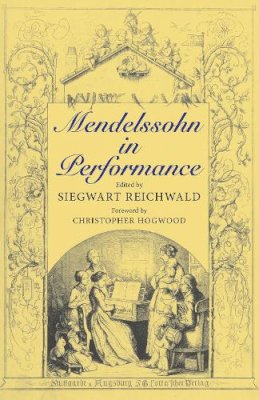Siegwart Reichwald is Associate Professor of Music History at Converse College and conducts the Converse Symphony Orchestra. He is author of The Musical Genesis of Felix Mendelssohn's Paulus. He lives in Spartansburg, South Carolina.
"This book does a superb job of explaining the 19th-century sound environment of Felix Mendelssohn and his audiences. Reichwald (Converse College) and his fellow contributors put forward the premise that knowing this historical world is critical for the modern performer. The relevant issues are many and complex, including, for example, the original concert venues, the circumstances of performance, the instruments available, the 19th-century public's expectations, and the meaning of Mendelssohn's notation. Suggesting solutions for the modern performer, the essays explore a variety of circumstances and problems: the smaller piano and its contemporary piano technique, organs available to Mendelssohn, violin technique, Mendelssohn's orchestral forces (about 45 to 50), performing venues (the home stage for theater events, the public stage for music/dramatic readings, and massive quasi-religious settings for Handel's works). The book also includes essays on Mendelssohn's scores (the interpretation of hairpins, abbreviations, metronome markings, tempo indications) and on the significance of contemporary text translations, some sanctioned by the multilingual Mendelssohn, some not (surprisingly, translations to German for works not originally written in that language are especially suspect). With this arsenal of knowledge, a performer can create an informed 21st-century rendition of a Mendelssohn work. Summing Up: Essential. Lower- and upper-division undergraduates, graduate students, professionals. —CHOICE"— C. Cai, emerita, Kenyon College, July 2009 "This book does a superb job of explaining the 19th-century sound environment of Felix Mendelssohn and his audiences. . . . Essential.July 2009"—Choice "Mendelssohn in Performance . . . should be on the shelf of every performer, scholar and devotee of Mendelssohn's music. July 2010, Vol. 7.1"—Nineteenth Century Music Review "[T]his book has something for everyone interested in Felix Mendelssohn: history, culture, reception, orchestras and instruments, editions and texts, Mendelssohn's sense of historicism, his performances of other composers, performances of his music in his time and later, and even modern films that use his music.14.1 2009"—Performance Practice Review "[Reichwald] has produced an exceptionally valuable, eminently useful, and very readable book. Any performer wishing to execute an historically informed performance of Mendelssohn's music—or of any other early-nineteenth-century Austro-German composer for that matter—would be well advised to study it thoroughly.29.1 2010"—Journal of Musicological Research "[Offers] fresh insights into the practicalities of performing one of the most familiar, yet misunderstood figures of European classical music."—R. Larry Todd, Duke University "This is a strikingly useful and welcome book that helps us not only understand Mendelssohn as a performer and composer but also details his place in contemporary culture and society. This first-class set of essays covers the entire range of Mendelssohn's stunning achievements and highlights his originality."—Leon Botstein, President, Bard University

